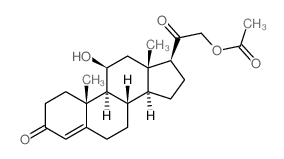Corticosterone 21-acetate in vivo induces acute stress in chicken thymus: cell proliferation, apoptosis and cytokine responses.
A Franchini, E Marchesini, E Ottaviani
Index: Histol. Histopathol. 19(3) , 693-9, (2004)
Full Text: HTML
Abstract
In vivo effects of acute stress induced by corticosterone 21-acetate in male Gallus domesticus thymus are studied and the steroid actions are evaluated in terms of cell proliferation, apoptosis and cytokine response in 10- and 21-day-old chickens. Steroid treatment induced thymocyte apoptosis and cell death decreased in the cortical-medullar direction and was more evident in younger animals. 24 h after treatment, the observed effect was reversed. The mitotic activity and thymic cells containing cytokine-like molecules were also affected. Indeed, the acute stress stimulated cytokine immunoreactivity to anti-IL-1alpha, IL-6 and TNF-alpha antibodies both in epithelial cells and interdigitating cells located in medullar and cortical-medullar regions. The increased cytokine expression observed after 12 h was maintained after 24 h. The comparison between 10- and 21-day-old chickens showed a lower number of cells containing cytokine-like molecules in younger specimens. The present findings suggest that cytokines activated by acute stress in vivo could contribute to restoring immunological homeostasis and influence thymic glucocorticoid-mediated functions.
Related Compounds
| Structure | Name/CAS No. | Molecular Formula | Articles |
|---|---|---|---|
 |
Pregn-4-ene-3,20-dione,21-(acetyloxy)-11-hydroxy-, (11b)-
CAS:1173-26-8 |
C23H32O5 |
|
Ontogeny of gastric mucosal permeability responses to lumina...
1986-05-01 [Am. J. Physiol. 250(5 Pt 1) , G617-24, (1986)] |
|
Chronic administration of corticosterone impairs LH signal t...
2000-03-01 [J. Steroid Biochem. Mol. Biol. 72(3-4) , 155-62, (2000)] |
|
Sensitivity to corticosterone-induced cleft palate is not as...
1984-05-01 [Proc. Soc. Exp. Biol. Med. 176(1) , 14-21, (1984)] |
|
Corticosterone induces rat liver alcohol dehydrogenase mRNA ...
1992-06-01 [Alcohol. Clin. Exp. Res. 16(3) , 427-31, (1992)] |
|
Development of gastric somatostatin-like immunoreactivity in...
1986-07-01 [Acta Endocrinol. 112(3) , 383-7, (1986)] |